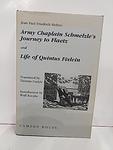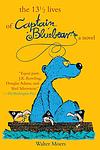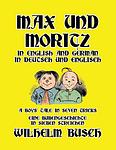The Greatest German "Humor" Books of All Time
Click to learn how this list is calculated.
This list represents a comprehensive and trusted collection of the greatest books. Developed through a specialized algorithm, it brings together 300 'best of' book lists to form a definitive guide to the world's most acclaimed books. For those interested in how these books are chosen, additional details can be found on the rankings page.
Genres
Humor is a category of books that is characterized by its ability to make readers laugh or feel amused. These books often contain witty dialogue, clever wordplay, and humorous situations that are designed to entertain and delight readers. Humor can be found in a variety of genres, including fiction, non-fiction, memoirs, and graphic novels, and can range from light-hearted and silly to dark and satirical. Whether you're looking for a quick laugh or a more in-depth exploration of the human condition through humor, there is something for everyone in the world of humorous books.
Countries
Date Range
Reading Statistics
Click the button below to see how many of these books you've read!
Download
If you're interested in downloading this list as a CSV file for use in a spreadsheet application, you can easily do so by clicking the button below. Please note that to ensure a manageable file size and faster download, the CSV will include details for only the first 500 books.
Download-
1. Baron Munchausen's Narrative Of His Marvelous Travels And Campaigns In Russia by Rudolf Erich Raspe
This book is a whimsical collection of exaggerated adventures and fantastical tales purportedly narrated by the eponymous Baron, a nobleman known for his incredible exploits and tendency towards hyperbole. Set against the backdrop of Russia and other exotic locales, the narrative takes the reader on a journey through impossible battles, encounters with mythical creatures, and miraculous escapes. The stories, characterized by their humor, satire, and outright absurdity, playfully critique the travel narratives and heroic tales popular at the time, inviting readers to question the nature of truth and fiction.
-
2. Dog Years by Günter Grass
"Dog Years" is a novel set in Germany during the rise and fall of the Nazi regime and the aftermath of World War II. The story is told from the perspectives of three friends: Walter Matern, a fervent Nazi supporter; Eduard Amsel, a Jewish artist who creates scarecrows; and Harry Liebenau, who narrates their stories. The novel explores the complexities of friendship and identity amidst the backdrop of war, guilt, and redemption. It also delves into the psychological impact of the Holocaust on German society and the struggle to come to terms with its horrific past.
-
3. Life Of Quintus Fixlein by Jean-Paul Richter
The book is a charming and idiosyncratic novel that chronicles the life of a small-town German schoolteacher, whose simple and contented existence is depicted through a series of letters and diary entries. The protagonist's life is marked by modest ambitions, endearing relationships, and a deep appreciation for the joys of everyday life. With a focus on the beauty of the mundane and the richness of the inner life, the narrative offers a poignant reflection on happiness, the passage of time, and the value of cherishing the small moments and personal connections that give life its true meaning.
-
4. The 13 1/2 Lives Of Captain Bluebear by Walter Moers
The book is a whimsical fantasy novel that follows the adventures of a blue bear as he navigates a world filled with bizarre creatures and surreal landscapes. With half a life more than the usual allotment for his species, the protagonist recounts his experiences, which range from being raised by mini-pygmies to attending an academy for gifted creatures, and from escaping the clutches of a carnivorous island to befriending a sentient tornado. Each of his thirteen and a half lives is a unique tale of curiosity, learning, and survival, set in a richly imagined universe that defies the ordinary at every turn.
-
5. Siebenkäs by Jean Paul
The novel is a complex, satirical love story set in provincial Germany during the late 18th century. The protagonist, a poor and idealistic lawyer, is trapped in an unhappy marriage with a shrewish wife. To escape his miserable existence, he fakes his own death and assumes a new identity. The book is filled with philosophical musings, humorous anecdotes, and vivid descriptions of rural life, reflecting the author's unique blend of realism and romanticism.
-
6. Sudelbücher by Georg Christoph Lichtenberg
"Sudelbücher" is a collection of thoughts, observations, and philosophical reflections by a prominent German satirist. The book is a compilation of his personal notebooks, where he jotted down everything from scientific observations to social commentary and personal introspection. The author's unique perspective and witty voice provide a fascinating glimpse into the mind of an 18th-century scholar, making this book an important piece of German literature and Enlightenment thought.
-
7. Max And Moritz by Wilhelm Busch
This classic German children's book, written in rhymed couplets, tells the story of two mischievous boys who engage in seven pranks, causing chaos and trouble in their village. Their antics range from tormenting animals to playing cruel jokes on the local inhabitants. However, their mischief eventually leads to a grim fate, serving as a cautionary tale about the consequences of bad behavior. The book is renowned for its humor, satirical tone, and the moral lessons it imparts, making it a staple of children's literature and an influential work in the genre of comic strips and graphic storytelling.
-
8. The Flounder by Günter Grass
The book is a rich tapestry of historical fiction and magical realism, weaving together the lives of a talking fish, a series of women cooks, and the men in their lives over several centuries. It explores themes of feminism, power, and the evolution of culinary arts, with the titular flounder serving as a guide and witness to the unfolding human drama. The narrative spans from the Stone Age to the modern era, reflecting on the changing roles and relationships between men and women, as well as the impact of these dynamics on culture and society. The novel is a blend of myth, satire, and allegory, presenting a unique perspective on the history of humanity through the lens of food and gender politics.
Reading Statistics
Click the button below to see how many of these books you've read!
Download
If you're interested in downloading this list as a CSV file for use in a spreadsheet application, you can easily do so by clicking the button below. Please note that to ensure a manageable file size and faster download, the CSV will include details for only the first 500 books.
Download






